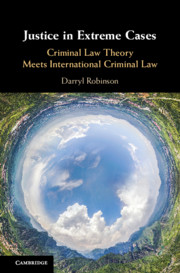Book contents
- Justice in Extreme Cases
- Justice in Extreme Cases
- Copyright page
- Contents
- Acknowledgements
- Cases, Statutes, and Other Authorities
- Abbreviations
- Part I Introduction and Problem
- 1 Introduction
- 2 The Identity Crisis of International Criminal Law
- Part II Proposed Solution: A Humanist, Coherentist, Deontic Account
- Part III Illustration through Application
- Book part
- Glossary of Selected Terms
- Bibliography
- Index
2 - The Identity Crisis of International Criminal Law
from Part I - Introduction and Problem
Published online by Cambridge University Press: 17 December 2020
- Justice in Extreme Cases
- Justice in Extreme Cases
- Copyright page
- Contents
- Acknowledgements
- Cases, Statutes, and Other Authorities
- Abbreviations
- Part I Introduction and Problem
- 1 Introduction
- 2 The Identity Crisis of International Criminal Law
- Part II Proposed Solution: A Humanist, Coherentist, Deontic Account
- Part III Illustration through Application
- Book part
- Glossary of Selected Terms
- Bibliography
- Index
Summary
In this chapter, I demonstrate the problem to which the rest of this book proposes a solution: namely, the need for more careful deontic reasoning. I will focus on certain distinctive habits of reasoning that have often recurred in ICL, which have a tendency to undermine compliance with deontic principles.
All legal systems sometimes generate doctrines that appear to conflict with stated principles. However, in national systems, the clash tends to be openly between liberal principles and ‘law and order’ considerations. I argue that ICL discourse often features an additional and interesting dynamic. In ICL, the distortions often result from habits of reasoning that are progressive and appropriate in human rights law and humanitarian law, but which become problematic when transplanted without adequate reflection to a criminal law system. I highlight three kinds of such reasoning: interpretive assumptions, substantive and structural assumptions, and ideological assumptions. These habits of reasoning were more prevalent in the early days of the renaissance of ICL than they are today. It is still valuable to discern and dissect these habits of reasoning, because their legacy continues, because they still recur today, and because they help show the value of attending to reasoning.
Keywords
- Type
- Chapter
- Information
- Justice in Extreme CasesCriminal Law Theory Meets International Criminal Law, pp. 20 - 56Publisher: Cambridge University PressPrint publication year: 2020

